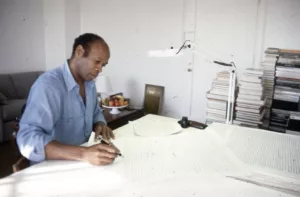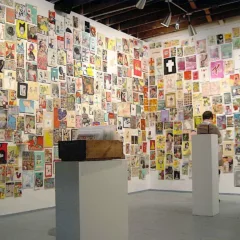Our TGV train clocked the trip from Karlsruhe to Paris (@281 miles) at a little over 3 hours. The train passed through lush farm lands, crossed the Rhine at Strasbourg and steamed into Paris, where we logged another hour between subway and walking before we reached to our Hotel du Parc Montsouris, in the 14th Arrondisement. I am not complaining! We were in Paris!
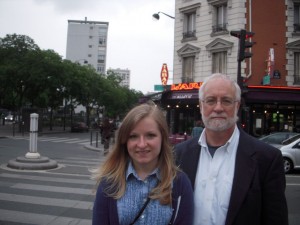
We loved being near the big park and Stella jogged there along with all the rest of the folks running around the pond. In a city where people don’t have front yards or back yards, the park is the front yard for all.
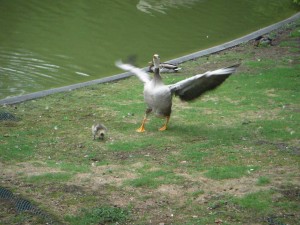
The name (Montsouris) does refer to mice, by the way, and yes apparently there were lots of rodents in this neighborhood once upon a time.
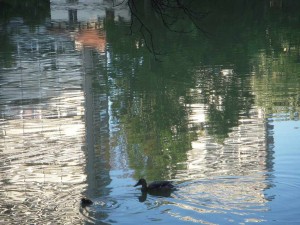
A wedding party was happily taking pictures on the grass one day, another day the lawn was dotted with picnickers. Families brought children to ride the ponies and watch the ducks, geese and swans. It was baby bird season and Stella and I checked in each day to see how the little ones were getting on.
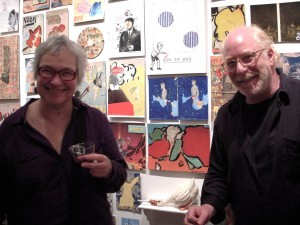
One of the great pleasures of the trip was seeing our Paris friends Matthew Rose and Max Mulhern, both of them artists and writers who turn in wonderful, surprising and heady posts for us. Matthew had me over for croissants and coffee and we talked about his work, his upcoming show in Williamsport, Pennsylvania (now up, check the link) and about the online world where we spend so much of our time. It was great to catch up and see a friend in the real world.
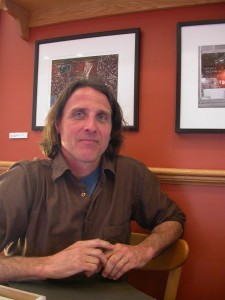
I met Max and his wife, Myriem and teenage daughter, Octavia, for couscous at their favorite restaurant in their neighborhood near St. Germain. Afterwards we ambled over to Pierre Herme for macaroons and to their apartment to talk.
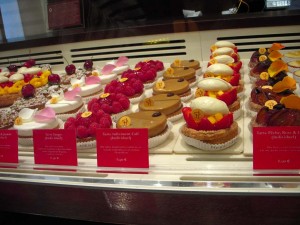
Max is in the thick of it with his Aqua Dice project, the greatest ocean-going floating craps game on earth, which launches this fall. He is managing the project like the good Captain should, making executive decisions right and left. He talked about how guilty he felt trying to do a little drawing now and then. Managing a project is different than managing a studio practice. It was a lovely afternoon and again, so very nice to see someone in the flesh. And this just in from Max via email: The construction of the Aqua Dice has begun and the ship that will take them out to sea to launch them, Les Tres Hombres, is on its way to Lisbon. Follow its progress here. Max will come aboard Nov. 10 with the dice and they will head for the Canary Islands and launch the dice somewhere enroute “when the best conditions prevail, ie when all will be windy and wavey.”
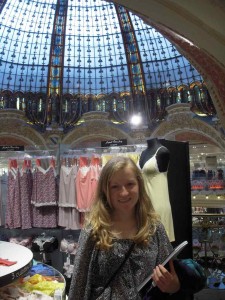
Our trip was short — only three days in the city — so we didn’t have a lot of time, but we walked around, hung out in the park, and ate several times at a great cafe near our hotel (trying to become locals in the short time we were there). One day Stella needed a shopping fix so we went to Galeries Lafayette, whose stained glass cupola ceiling is itself worth the trip. It was Saturday and the store was mobbed with tourists (no surprise). What did surprise us was that each boutique within the store (Chanel, Vuitton, etc) had a crowd control system in place, with a bouncer outside controlling the flow of people into and out of the space. And people lined up waiting to get in.
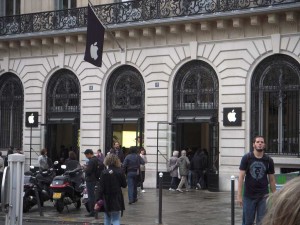
Nearby, outside near the Paris Opera we spotted the Apple Store. Have they always had that pirate-like flag — white apple on black field? Or is this a memorial for Steve Jobs? Either way it gives the store a funereal look. The store was filled, like most Apple stores are on the weekends.
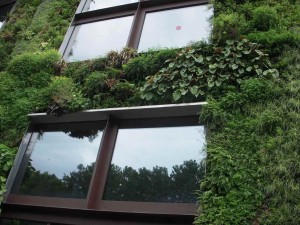
Our one museum trip was to Quay Branly, the museum for primitive art. The place is a knock out architecturally, from the exterior vegetation wall to the hyper-dramatic installation inside of objects from tribal cultures at the four corners of the earth — Oceania, Asia, Africa and the Americas — (although none from Europe, as artblog’s Andrea Kirsh pointed out when we were talking about it).
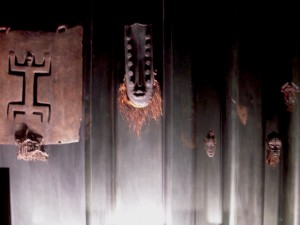
The objects are in glass cases and some of them are in small chapel-like spaces. Overall, the ambiance communicates that what is on view is holy or sacred and incredibly important to humanity. Of course there is P. T. Barnum spectacle and showmanship here as well, in a museum that has to compete with Hollywood and Disney. It’s an eyeful.
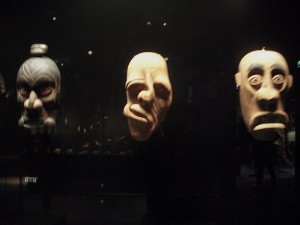
Stella and I had just seen Documenta and been taken with Kader Attia’s installation of carved deformed heads. So when I saw the carved heads (above) they immediately reminded me of Attia’s. If I understood the explanation of these heads these facial distortions were carved for fun — not to ward off evil spirits or attacking forces. So I have to take their function as art.
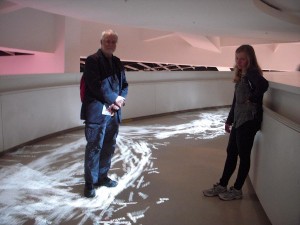
To get to the collection viewers must walk up a spiraling ramp. The idea reminded me of the Guggenheim’s long ramp. Here, a light projection of words swims at your feet and keeps you moving forward. The light river is a flowing stream of words, from family surnames from around the world to scraps and bits of words and phrases in all different languages — a clever piece dubbed a “word waterfall.” Charles Sandison is the artist and “The River” is the title. See video here.
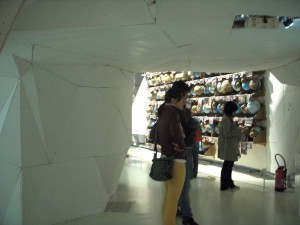
The special exhibit, Masters of Chaos, was a mystical and also spectacularly designed addition to what was a pretty special museum trip. Guest curated by Jean de Loisy, art historian, curator and president of the contemporary art space Palais de Tokyo, the show weaves together the idea of chaos in the cosmos and the humans, shaman, and artists who deal with it by invoking and then dispelling it.
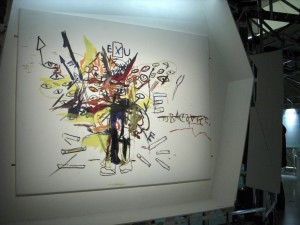
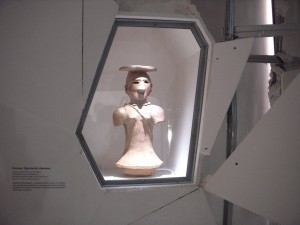
On view are artifacts from Quay Branly’s collection of shamanist objects — and art objects by Joseph Beuys, Jean Michel Basquiat, Thomas Hirschhorn, Paul McCarthy, George Condo, Picasso and a host of others.
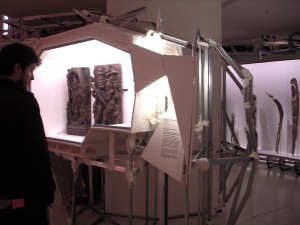
One section of the exhibit, which had a science advisor, was made up of video testimonials by actual shaman, collected by anthropologist Bertrand Hell.

Perhaps the most innovative part of this wild and evocative exhibit is the installation design by architects Dominique Jakob and Brendan MacFarlane, which captures the idea of chaos and disorder so much that it almost upstages the entire exhibit. Upon entering the exhibit you pass through a small cave-like entry and see Thomas Hirschhorn’s array of wounded globes(must be a sister piece of the one the PMA bought). Because Hirschhorn is also known for creating the rough-hewn cave, Cavemanman, in gallery spaces, using cardboard and brown packing tape, I thought at first Hirschhorn had engineered the installation. I think the installation is very much beholden to the artist’s trailblazing gallery cave.
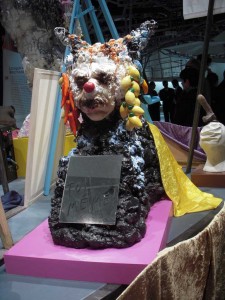
As you left the inwardly-spiraling cave-like environment the last space included a group of Carnivalesque figures and grotesques. There is a sign on which is written “pas d’art sans disorder” no art without chaos, stating the obvious theme of the show. While I think the exhibit is right on the money about artists courting chaos, the point is overshadowed by the show’s spectacular installation which suggests that the world of building — even in its crudest form –is the cauldron where chaos lives and breathes — and is contained.
More pictures of the show and of Paris at flickr.


